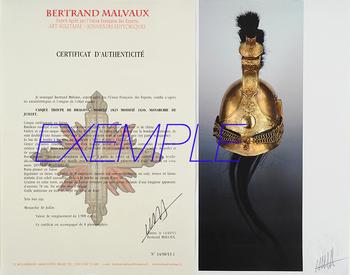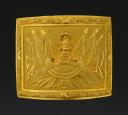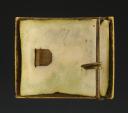
BELT PLATE WHICH BELONGED TO GENERAL JEAN-BAPTISTE AUGIER, model of the 1st Vendemiaire Year XII (September 24, 1803), First Empire, 1804-1815.
BELT PLATE WHICH BELONGED TO GENERAL JEAN-BAPTISTE AUGIER, model of the 1st Vendemiaire Year XII (September 24, 1803), First Empire, 1804-1815.
Rectangular bronze plaque entirely carved, gilded with mercury with protruding and smooth part burnished with agate stone. H 7.2 cm, width without curvature 8.1 cm, width with curvature 9.4 cm. In the center is represented a shield decorated with a ribbed disc framed by a beaded molding and bordered on either side by an eagle's head. This shield is placed on a bundle of lictors surmounted by a plumed helmet. In the background is a bundle of sparkling winged flags. Matte sandblasted bottom of the tray. Framing strip decorated with oak branches, placed on a flat molding. Complete plate on the rear part of its hook and its trigger guard with two barbs. It is lined with white calfskin bearing the handwritten inscription “Augier”.
France.
First Empire (1804-1815).
Superb condition, high quality carving.
FAMILY ORDER.
BIOGRAPHY :
Jean-Baptiste Augier, born January 25, 1769 in Bourges, died September 3, 1819 in Bourges (Cher), is a French general and politician of the Revolution and the Empire.
Intended for the bar by his father, dean of the law faculty of the University of Bourges, Augier had begun his law studies when the Revolution broke out. He enlisted, stood out for his courage and was charged with the defense of Fort Bitche (1794) where he was injured by a shrapnel.
He then obtained sedentary command of the divisions of Cher, then of Manche; was named knight of the Legion of Honor on 19 Frimaire Year XII, and commander on the following 25 Prairial, and returned to active service in the army of Spain.
In 1812, in the Russian army, he commanded the place of Kœnigsberg. Back in France, the conservative Senate elected him a member of the Legislative Corps on January 14, 1813.
His legislative conduct appeared uncertain: sometimes he seemed to move closer to the liberal opposition; sometimes, he took more conservative positions, and spoke out in favor of the emigrants.
A declared supporter of the return of the Bourbons, he put his sword in the service of Louis XVIII, during the return from the Island of Elba, and received the cross of Saint-Louis during the second Restoration.
Mr. Augier's political hesitation ceased at the Hundred Days. No one, in this circumstance, showed more pronounced opposition, a more ardent zeal against the Emperor than Mr. Augier. He proposed the most violent means to stop him in his progress: suspension of legal proceedings in favor of those who would fight against him, national awards, medals of honor, campaign paid as triple, etc. He also wanted the tricolor cockade to be adopted: a motion that the ultra-royalists rejected with indignation.
At the session of October 14, 1814, he protested against the importation of foreign iron, and defended the factory owners, ruined by the legislation of the time (inhabitant of Berry and owner of considerable forges, he could only be concerned by these cases). The following November, he declared himself in favor of the export of wool, in the interests of commerce. Charged with the report on the affair of Mr. de Blons, who, finding himself at mass with the mayor of his commune, claimed that he must first be presented with the blessed bread, and shouted out loud: “Sacristan, bring it!” », he proposed harsh measures against the pretensions of the nobles.
The speed of Napoleon I's march disconcerted these projects and the measures that the government had taken. The "Eagle", returning to the Tuileries, dismissed Augier, who, the same day, sent him his resignation.
The king appointed him on July 27, 1815, president of the electoral college of the district of Saint-Amand (Cher); on August 22, he was elected deputy by the college of the department of Cher with 114 votes out of 134 voters and 188 registered, and re-elected, by the same college, on October 4, 1816, with 87 votes out of 136 voters and 185 registered.
After the second restoration, restored to his titles, he soon sat, in the center and always among the ministerial majority, in what the king called “the untraceable Chamber”. Augier showed himself to be moderate in the midst of the delirium. He hardly left the center: he asked that the loan of 100 million not be entered in the ledger nor repaid by means of a new tax; that soldiers could accumulate pensions up to the sum of 700 francs; and defended the arrears of the Cher department.
Louis XVIII created him baron on February 1, 1817. He died on September 3, 1819 in Bourges where he was buried in the Capuchin cemetery (the grave still exists today).
FAMILY LIFE
Son of the legitimate marriage of Louis Augier, advisor to the king, dean and professor of the law faculty of the University of Bourges, and Geneviève L'heureux de la Gauguière, Jean-Baptiste Augier married Luce-Elisabeth on March 6, 1794. Aimée de Chevenon de Bigny who will give him:
Edouard Augier (October 6, 1795 - Bourges ✝ May 2, 1866 - Bourges), Second lieutenant in the 61st line then in the 4th dragoon regiment, aide-de-camp to his father (1813-1815), Captain of the Chasseurs à cheval of the Allier, farmer and owner of the castle of Serruelles, mayor of Serruelles (Cher), general councilor of Cher, knight of the Legion of Honor;
a daughter, married in 1852 to Anselme de Bosredon (✝ 1894), who succeeded his father-in-law as mayor of Serruelles (Cher);
Marie-Césarine (born in 1795), married to Xavier Aubertot (1791 ✝ 1867).
SERVICE STATUS
Enlisted as a volunteer in the 1st volunteer battalion of Cher on July 25, 1792;
Captain on August 25, 1792;
Brigadier general on January 21, 1794;
Assigned to the Army of the Ardennes (January 27, 1794 - June 13, 1795);
Put under reform treatment on June 13, 1795;
Commander of the Cher department (21st military division) (August 25, 1799 - May 7, 1800);
Commander of the Calvados department (14th military division) (May 7, 1800 - 1801);
Commander of the Department of Manche (14th military division) (1801 - September 24, 1801);
Commander of the Cher department (21st military division) (September 24, 1801 - June 10, 1808);
Assigned to the 10th military division (June 10, 1808 - July 9, 1808);
Assigned to the army of Spain (July 9, 1808 - April 11, 1810);
Commander of the Cher department (21st military division) (April 11, 1810 - June 3, 1812);
Commander of the 3rd Brigade of the 1st Reserve Division of the Grande Armée (June 3, 1812 – May 18, 1813);
Commander of the place of Königsberg during the Russian campaign (1812);
Commander of the Cher department (21st military division) (May 18, 1813 - March 26, 1815);
Placed on leave (March 26, 1815 - March 31, 1817);
Commander of the department of Cher (March 31, 1817 - April 30, 1817);
Commander of the Loiret department (April 30, 1817 - March 18, 1818);
Commander of the department of Cher (March 18, 1818 - September 3, 1819).
CAMPAIGNS
Northern Army (1792 - 1794):
Battle of Valmy;
Army of the Ardennes (1794 - 1795):
Siege of Bitche (1794);
Austrian campaign (1805);
Campaign of Prussia (1806) and Poland (1807) in the Grand Army
Employed in the Spanish army (1808-1810);
Russian campaign (1812) to the Grand Army.
FEATURES
Distinguished at the Battle of Valmy
His defense of Fort Bitche (1794) against a large body of Austrians brought him rapid advancement.
INJURIES
In Bitche, he was dangerously injured by a shrapnel, which required the amputation of a limb.
DECORATIONS
Legion of Honor :
Legionnaire on 19 Frimaire Year XII (December 11, 1803), then,
Commander of the Legion of Honor on 25 Prairial Year XII (June 14, 1804);
Royal and Military Order of Saint-Louis:
SECURITIES
Knight of the Empire by imperial decree of December 14, 1809;
Baron:
Royal order of December 31, 1814,
Confirmed hereditary baron by letters patent of February 1, 1817 with regulation of coat of arms.
Bibliography:
“Regulations on the uniforms of generals of officers of the army staffs...” is accepted on 1st Vendémiaire Year XII (September 24, 1803), it is published in the official military journal of 1803, illustrated with twelve engraved plates.
Concerning general officers of all ranks, the regulations prescribe: “The plaque, of gilded and chiseled metal, representing in relief a weapons trophy...”.
Rectangular bronze plaque entirely carved, gilded with mercury with protruding and smooth part burnished with agate stone. H 7.2 cm, width without curvature 8.1 cm, width with curvature 9.4 cm. In the center is represented a shield decorated with a ribbed disc framed by a beaded molding and bordered on either side by an eagle's head. This shield is placed on a bundle of lictors surmounted by a plumed helmet. In the background is a bundle of sparkling winged flags. Matte sandblasted bottom of the tray. Framing strip decorated with oak branches, placed on a flat molding. Complete plate on the rear part of its hook and its trigger guard with two barbs. It is lined with white calfskin bearing the handwritten inscription “Augier”.
France.
First Empire (1804-1815).
Superb condition, high quality carving.
FAMILY ORDER.
BIOGRAPHY :
Jean-Baptiste Augier, born January 25, 1769 in Bourges, died September 3, 1819 in Bourges (Cher), is a French general and politician of the Revolution and the Empire.
Intended for the bar by his father, dean of the law faculty of the University of Bourges, Augier had begun his law studies when the Revolution broke out. He enlisted, stood out for his courage and was charged with the defense of Fort Bitche (1794) where he was injured by a shrapnel.
He then obtained sedentary command of the divisions of Cher, then of Manche; was named knight of the Legion of Honor on 19 Frimaire Year XII, and commander on the following 25 Prairial, and returned to active service in the army of Spain.
In 1812, in the Russian army, he commanded the place of Kœnigsberg. Back in France, the conservative Senate elected him a member of the Legislative Corps on January 14, 1813.
His legislative conduct appeared uncertain: sometimes he seemed to move closer to the liberal opposition; sometimes, he took more conservative positions, and spoke out in favor of the emigrants.
A declared supporter of the return of the Bourbons, he put his sword in the service of Louis XVIII, during the return from the Island of Elba, and received the cross of Saint-Louis during the second Restoration.
Mr. Augier's political hesitation ceased at the Hundred Days. No one, in this circumstance, showed more pronounced opposition, a more ardent zeal against the Emperor than Mr. Augier. He proposed the most violent means to stop him in his progress: suspension of legal proceedings in favor of those who would fight against him, national awards, medals of honor, campaign paid as triple, etc. He also wanted the tricolor cockade to be adopted: a motion that the ultra-royalists rejected with indignation.
At the session of October 14, 1814, he protested against the importation of foreign iron, and defended the factory owners, ruined by the legislation of the time (inhabitant of Berry and owner of considerable forges, he could only be concerned by these cases). The following November, he declared himself in favor of the export of wool, in the interests of commerce. Charged with the report on the affair of Mr. de Blons, who, finding himself at mass with the mayor of his commune, claimed that he must first be presented with the blessed bread, and shouted out loud: “Sacristan, bring it!” », he proposed harsh measures against the pretensions of the nobles.
The speed of Napoleon I's march disconcerted these projects and the measures that the government had taken. The "Eagle", returning to the Tuileries, dismissed Augier, who, the same day, sent him his resignation.
The king appointed him on July 27, 1815, president of the electoral college of the district of Saint-Amand (Cher); on August 22, he was elected deputy by the college of the department of Cher with 114 votes out of 134 voters and 188 registered, and re-elected, by the same college, on October 4, 1816, with 87 votes out of 136 voters and 185 registered.
After the second restoration, restored to his titles, he soon sat, in the center and always among the ministerial majority, in what the king called “the untraceable Chamber”. Augier showed himself to be moderate in the midst of the delirium. He hardly left the center: he asked that the loan of 100 million not be entered in the ledger nor repaid by means of a new tax; that soldiers could accumulate pensions up to the sum of 700 francs; and defended the arrears of the Cher department.
Louis XVIII created him baron on February 1, 1817. He died on September 3, 1819 in Bourges where he was buried in the Capuchin cemetery (the grave still exists today).
FAMILY LIFE
Son of the legitimate marriage of Louis Augier, advisor to the king, dean and professor of the law faculty of the University of Bourges, and Geneviève L'heureux de la Gauguière, Jean-Baptiste Augier married Luce-Elisabeth on March 6, 1794. Aimée de Chevenon de Bigny who will give him:
Edouard Augier (October 6, 1795 - Bourges ✝ May 2, 1866 - Bourges), Second lieutenant in the 61st line then in the 4th dragoon regiment, aide-de-camp to his father (1813-1815), Captain of the Chasseurs à cheval of the Allier, farmer and owner of the castle of Serruelles, mayor of Serruelles (Cher), general councilor of Cher, knight of the Legion of Honor;
a daughter, married in 1852 to Anselme de Bosredon (✝ 1894), who succeeded his father-in-law as mayor of Serruelles (Cher);
Marie-Césarine (born in 1795), married to Xavier Aubertot (1791 ✝ 1867).
SERVICE STATUS
Enlisted as a volunteer in the 1st volunteer battalion of Cher on July 25, 1792;
Captain on August 25, 1792;
Brigadier general on January 21, 1794;
Assigned to the Army of the Ardennes (January 27, 1794 - June 13, 1795);
Put under reform treatment on June 13, 1795;
Commander of the Cher department (21st military division) (August 25, 1799 - May 7, 1800);
Commander of the Calvados department (14th military division) (May 7, 1800 - 1801);
Commander of the Department of Manche (14th military division) (1801 - September 24, 1801);
Commander of the Cher department (21st military division) (September 24, 1801 - June 10, 1808);
Assigned to the 10th military division (June 10, 1808 - July 9, 1808);
Assigned to the army of Spain (July 9, 1808 - April 11, 1810);
Commander of the Cher department (21st military division) (April 11, 1810 - June 3, 1812);
Commander of the 3rd Brigade of the 1st Reserve Division of the Grande Armée (June 3, 1812 – May 18, 1813);
Commander of the place of Königsberg during the Russian campaign (1812);
Commander of the Cher department (21st military division) (May 18, 1813 - March 26, 1815);
Placed on leave (March 26, 1815 - March 31, 1817);
Commander of the department of Cher (March 31, 1817 - April 30, 1817);
Commander of the Loiret department (April 30, 1817 - March 18, 1818);
Commander of the department of Cher (March 18, 1818 - September 3, 1819).
CAMPAIGNS
Northern Army (1792 - 1794):
Battle of Valmy;
Army of the Ardennes (1794 - 1795):
Siege of Bitche (1794);
Austrian campaign (1805);
Campaign of Prussia (1806) and Poland (1807) in the Grand Army
Employed in the Spanish army (1808-1810);
Russian campaign (1812) to the Grand Army.
FEATURES
Distinguished at the Battle of Valmy
His defense of Fort Bitche (1794) against a large body of Austrians brought him rapid advancement.
INJURIES
In Bitche, he was dangerously injured by a shrapnel, which required the amputation of a limb.
DECORATIONS
Legion of Honor :
Legionnaire on 19 Frimaire Year XII (December 11, 1803), then,
Commander of the Legion of Honor on 25 Prairial Year XII (June 14, 1804);
Royal and Military Order of Saint-Louis:
SECURITIES
Knight of the Empire by imperial decree of December 14, 1809;
Baron:
Royal order of December 31, 1814,
Confirmed hereditary baron by letters patent of February 1, 1817 with regulation of coat of arms.
Bibliography:
“Regulations on the uniforms of generals of officers of the army staffs...” is accepted on 1st Vendémiaire Year XII (September 24, 1803), it is published in the official military journal of 1803, illustrated with twelve engraved plates.
Concerning general officers of all ranks, the regulations prescribe: “The plaque, of gilded and chiseled metal, representing in relief a weapons trophy...”.
Price :
7 200,00 €
| Destination | Envoi recommandé | Envoi Recommandé + Express |
|---|---|---|
| Shipping France | 11,00 € | 30,00 € |
| Shipping Europe | 12,00 € | 50,00 € |
| Shipping world | 34,00 € | 70,00 € |
Insurance (1%) :
72,00 €
Reference :
28645-1

Next update Friday, april 4th at 1:30 PM
FOR ALL PURCHASES, PAYMENT IN MULTIPLE CHECKS POSSIBLE
bertrand.malvaux@wanadoo.fr 06 07 75 74 63
An authenticity certificate of the item including the description published on the site, the period, the sale price, accompanied by one or more color photographs is automatically provided for any item priced over 130 euros. Below this price, each certificate is charged 5 euros.
Only items sold by me are subject to an authenticity certificate, I do not provide any expert reports for items sold by third parties (colleagues or collectors).

